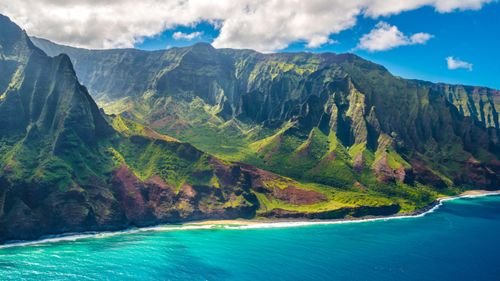Travel to Hawaii during Covid-19: What you need to know before you go

If you’re planning to travel to Hawaii, here’s what you’ll need to know and expect if you want to visit during the Covid-19 pandemic.
The basics
Hawaii reopened to visitors from within the United States and a small number of countries in October, but visitors must provide evidence of a negative Covid-19 test result.
All air passengers entering the United States must now present a negative test result. See below for details on which test types are approved specifically for the state of Hawaii, including for Americans arriving from other states.
What’s on offer
Spectacular surfing, sandy beaches, traditional Pacific culture and rugged volcanoes — including the ongoing eruption of Kīlauea. You can get daily updates on volcanic activity from the US Geological Survey here.
Hawaii’s geographical position and proud history make it unlike anywhere else in the United States.
Who can go
Travelers from other US states, Canada, Japan, South Korea and Taiwan are allowed to bypass Hawaii’s mandatory 10-day quarantine on most islands by following strict pre-travel testing rules (see below).
Beyond those places, Hawaii is following CDC guidelines, meaning those who have been in Brazil, China, the European Schengen Area, Iran, Ireland, South Africa, India and the United Kingdom in the past 14 days will be denied entry.
Travelers from all other countries must undergo a 10-day quarantine. Check the Safe Travels Hawai’i site for details as the situation evolves.
All tourists must also complete a Safe Travels Hawaii form, and many will need to undergo a health screening on arrival. A couple of islands also require a second Covid-19 test upon arrival.
What are the restrictions?
Hawaii’s travel restrictions change often.
Currently, all travelers must either undergo a 10-day quarantine or — if traveling from a handful of countries (listed above) — avoid quarantine by presenting a negative test from a “trusted partner,” a list of which can be found on the Hawaii Covid-19 website.
For air travelers 5 and older entering Hawaii from abroad, getting a test from one of Hawaii’s approved Trusted Testing Partners will be particularly important because some tests accepted under the US testing entry requirement that went into effect in January would not allow travelers to bypass Hawaii’s quarantine.
Travelers, including those arriving from the US mainland, must have a negative test result before departing on the last leg of their trip to Hawaii. Test results must be uploaded to the Safe Travels Hawaii site before your flight to the islands or printed out prior to departure with the hard copy ready to present upon arrival. Otherwise, you will incur the 10-day quarantine.
The county of Hawai’i ended its program of requiring a post-arrival test for direct trans-Pacific travelers on June 2, and Kahului Airport on Maui ended post-arrival test requirement on June 4.
Registration with Safe Travels Hawaii as soon as flights are booked is mandatory for all travelers older than 18.
Fully vaccinated Hawaii residents traveling between the state’s counties can bypass pre-travel testing and quarantine with CDC proof-of-vaccination cards.
On June 15, all restrictions on inter-county travel were lifted, meaning no pre-travel testing or quarantining will be needed for travel between the Hawaiian islands.
What’s the Covid situation?
With only about 37,170 cases and 507 deaths reported as of June 18, Hawaii has seen relatively low Covid numbers compared with other US states. Strict lockdown measures were put in place in March 2020 to ensure that the islands were not overwhelmed.
What can visitors expect?
Some restrictions can vary by island, but masks are no longer required outside on a statewide basis. However, mask wearing is highly recommended when in a large group outdoors. And the indoor mask mandate remains unchanged.
Oahu has implemented a five-tier system of restrictions. Oahu has moved to Tier 4, according to a recent announcement from Rick Blangiardi, mayor of the city and county of Honolulu. Tier 5 is the least restrictive.
The move to Tier 4 means social gatherings of up to 25 people outdoors (including parks and beaches) and 10 people indoors. Commercial recreational boating is allowed without capacity limits (restaurant rules apply if food or drinks are served). Read more about the move to Tier 4 here.
Maui, Molokai and Lanai — all in Maui County — allow for gatherings of up to 10 people. Beaches and Maui County Parks are open.
On Hawaii Island, outdoor gatherings of up to 25 people are permitted as long as masks are worn and social distancing rules followed. Indoor gatherings are limited to 10 people. Beaches are open.
The island of Kauai has returned to Tier 4 status from Tier 3. The move increases the indoor social gathering limit to 10 while maintaining limits on outdoor groups at 25 people. Restaurants and bars are open but limited to 50% capacity indoors. Pools and beaches are open. When 70% of Kauai’s population achieves full vaccination, it will be at Tier 6, which will allow all operations to be open with no limits.
Gov. David Ige announced on June 7 that when the state reaches a 60% vaccination rate, social gatherings can hold 25 indoors and 75 outdoors. Restaurants will be allowed up to 75% capacity (with maximum groups size of 25 indoors and 75 outdoors).
Useful links
Covid-19 State of Hawaii portal
Hawaii Trusted Travel Partners
Hawaii Covid-19 Travel News and Headlines
Our recent coverage
Find out about the woman who gave birth to a baby while flying to Hawaii — she didn’t even know she was pregnant!
What’s it like traveling to Hawaii during the pandemic? CNN’s Brekke Fletcher wrote about her experience here.
For vacation tips, have a look here. If you’re a closet beach hater, here are some ideas of what you can do. Or have a look at the cats of Lana’i, where 600 of them are living their best life.